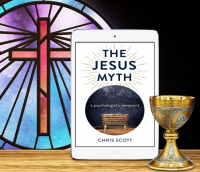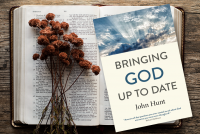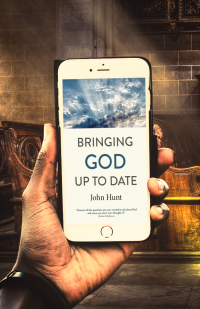
The year after Charles Darwin died, a man was born who was to have a seminal role in the development of a ‘new orthodoxy’ in Christian thought. Studdert Kennedy is widely known as the priest and poet ‘Woodbine Willie’, the affectionate name given to him by the men with whom he served in France during the Great War 1914-18. He is remembered also as a gifted preacher and orator of exceptional eloquence and power who had a rare ability to communicate his understanding of God to ordinary people and to make God ‘real’ to the many to whom he seemed to be dead. He happens to be a great hero of mine, someone who perhaps more than any other has informed my knowledge, understanding, and love of God, and I believe that his prose and poetry deserve to be more widely read.
He was a theologian of creativity and originality whose
writings were dominated by the severe theological and ethical
struggles with the experience of war. It was theology quite
literally forged in fields of fire. For him, the great illumination
came from the realization that God does not watch our suffering
from afar, untouched and untroubled by it, but himself suffers
in, with and for his creation. The cross became the centre of all
his faith in God, and a theodicy with a weak and suffering God
at its heart was central to his thought. His thoughts and ideas
received a mixed reception in his own lifetime but were later
taken up by others who themselves sought to address the
involvement of God in the sufferings of humanity as the horrors of war and the Holocaust darkened the world once again.
The sorrows o’ God must be ’ard to bear
If ’E really ’as Love in ’Is ’eart,
And the ’ardest part i’ the world to play
Must surely be God’s part.
(Studdert Kennedy 1927:132)
At the dawn of a new day after a battle, under a red sky on a
perfect morning, Studdert Kennedy is moved to ponder the
‘unutterable beauty’ of nature. He argues that one cannot leave
nature out of religion because nature drives human beings to
belief in something or someone behind it. The beauty of nature’s
colours and the music of its sounds call us to worship their
Maker in gratitude, to put into words some expression of our
love and praise. But nature’s many voices seem to contradict one
another – there is tenderness and cruelty, order and chaos,
beauty and ugliness. If one believes in an Almighty God who
could have made a perfect, painless, sinless world at a stroke,
then one would curse him for nature’s manifest imperfections
and many cruelties. There is clearly much here that connects
with the observations of Darwin and Malthus on the struggle for
existence that rages through all living nature.
He goes on to argue that the entire created order is the fruit
not only of God’s power but also of God’s pain, the pain of a
striving and suffering Creator. But nature’s ‘horror chambers’ are
not eternal; just as the cross is followed by an empty tomb and
victory, they are only temporary and contingent and God will
overcome them in the end. God is striving, suffering, crucified
but unconquerable. The truth of God in nature is the truth of
Christ crucified and risen again to reveal the suffering but
triumphant Father.
Studdert Kennedy’s ministry ran its course through the
poverty of the Edwardian era, the appalling loss of life of the
1914-18 war, and the disillusion and depression of the 1920s
which followed. In his opposition to suffering, however caused,
he played an influential part in the development of a new
theodicy that sought to protest against evil and create a motive
to overcome it.
He saw as abhorrent any attempt to justify evil and suffering as
being God-willed and of divine purpose (Irenaeus), and saw as
inadequate the ‘free will defence’ (Augustine/Aquinas) because
it portrayed God as being untouched or untroubled by the suffering of his creation. It did not take account of the God who
suffers in, with and for his creation, nor did it say anything about
what Christ is meant to have revealed of God’s nature. He
realized that these attempts to justify or defend God’s action or
inaction in the world would only distance people further from
God, and that the question the theologian ought to be asking is
‘where can we actually see God himself in the midst of all this
evil and suffering?’ Studdert Kennedy saw God present in the
muddy, bloody hero in the trenches of the Western Front. In this
act of solidarity with all human suffering there is the cry of God
himself joining in the protest of humanity against him, ‘My God,
my God, why have you forsaken me?’ (Matthew 27.46). And in
this protest, there is no passive acquiescence with evil and
suffering but rather a call to overcome it, to seek the future in
which the will of God will be fulfilled:
Passionately fierce the voice of God is pleading,
Pleading with men to arm them for the fight;
See how those hands, majestically bleeding,
Call us to rout the armies of the night.
(Studdert Kennedy 1927:3)
To be afflicted by evil is not to be afflicted by God but to be
appointed in Christ to join God’s fight to conquer evil wherever
it is to be found.

BUY NOW
Categories:
0 comments on this article







